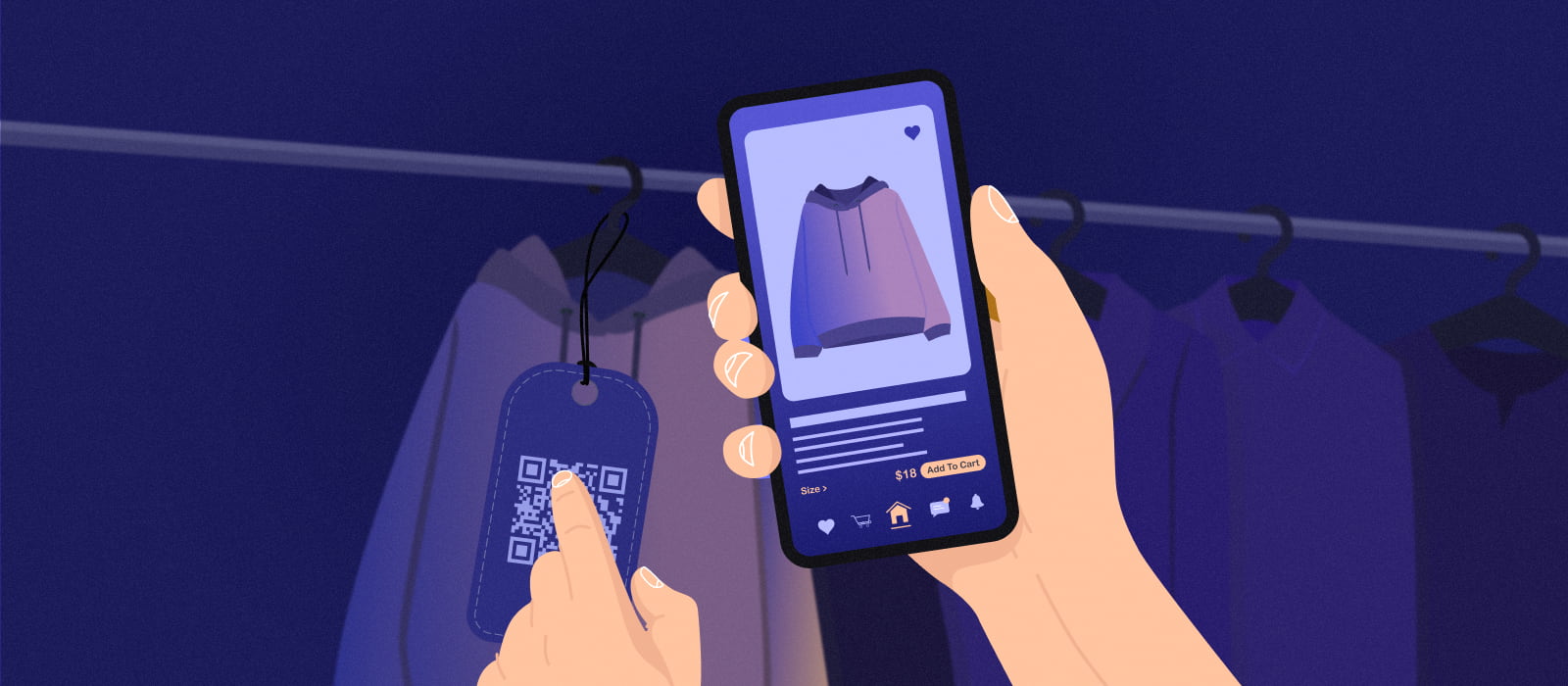Ensuring transparency across the intricate stages of the modern supply chain poses a significant challenge. Fortunately, digital product passports promise to tackle this complexity, enhancing traceability and accountability of the goods throughout their lifecycle.
Before reaching the consumer, most items have to travel long distances and be handed over to numerous intermediaries. This complexity presents challenges in ensuring that goods are made sustainably, delivered on time, in good condition, and at a reasonable cost.
According to the McKinsey survey, 45% of businesses interviewed have limited supply chain visibility. To address this issue, the European Union promotes the implementation of digital product passports (DPP), primarily in sectors like textiles, plastics, and chemicals. It’s projected that by 2026, businesses from these fields will adopt the DPP solution.
In this article, we will explain how digital product passports work and what benefits they bring to manufacturers and consumers, as well as shed light on what aspects companies need to consider when leveraging DPPs.
What is a digital product passport?
![]()
A digital product passport is a solution designed to provide comprehensive and standardized information about a physical product throughout its lifecycle. It should cover such aspects as:
Manufacturing details, specifying the materials used in the production, their origin, and the working conditions of people involved in manufacturing.
Design details, defining the product’s appearance: color schemes, textures, shapes, etc.
Performance details, outlining how long the product is expected to last, its functions, usage and assembly instructions, and disposal or recycling recommendations.
Sustainability details, clarifying a product’s environmental impact, such as its carbon footprint, energy efficiency, and recyclability.
Shipment details, featuring the sources of raw materials, transportation data, and assembly locations.
Quality assurance details, providing the results of quality control tests, inspections, and certifications obtained during manufacturing.
Safety and compliance details, ensuring that the product meets legal and industrial requirements.
Explore the diverse range of supply chain solutions in our portfolio
What are the benefits of digital product passports?
![]()
Digital product passports bring lots of benefits to businesses and consumers, including:
Upgraded transparency — DPPs provide a transparent and easily accessible source of information about a product’s lifecycle, from design to disposal. This transparency builds trust among consumers, investors, and regulatory authorities.
Consumer empowerment — digital product passports allow consumers to make data-driven decisions about whether to buy a product based on factors such as sustainability, safety, and quality.
Supply chain efficiency — manufacturers can leverage digital product passports to improve their supply chain performance by minimizing inefficiencies and proactively managing potential risks.
Improved sustainability — by recording data on a product’s environmental impact, DPPs can motivate companies to opt for more sustainable materials and manufacturing practices.
Efficient recall management — if a product is recalled, digital product passports can streamline the identification and tracking of affected items, reducing the impact on consumers and minimizing costs.
Counterfeit reduction — DPPs help combat counterfeiting by providing a way to verify the authenticity of products, thus protecting brand integrity.
Enhanced brand reputation — leveraging a digital product passport is a token of a company’s commitment to quality, safety, and ethical practices, setting it apart from competitors.
Meet Blockverify — a blockchain-powered supply chain and anti-counterfeit solution
Overview of digital product passport technologies
![]()
For efficient functioning, digital product passports require cutting-edge technologies, such as blockchain, IoT, big data, QR codes, cloud, and API.
Let’s take a look at how these technologies make DPPs a reality.
Blockchain
Blockchain provides a secure and decentralized framework for storing and managing product-related data, making it an ideal choice for digital product passports.
Thanks to its immutable nature, blockchain ensures that once data is recorded in the ledger, it cannot be altered or deleted. This is crucial for maintaining the integrity of product information throughout its lifecycle.
Blockchain provides robust access control mechanisms, ensuring that only authorized individuals or entities can update specific parts of the product passport, ensuring the data stays authentic.
Explore our blockchain development services and leverage our expertise for your business growth
IoT
The Internet of Things (IoT) enables the collection of real-time data from physical products and their surroundings via sensors, RFID tags, and GPS trackers. The technology makes it possible to update the product’s digital passport in real time by transmitting information about the item’s location, condition, usage, and performance to a central database or directly to the blockchain.
Big data
Big data analytics helps businesses identify the most relevant and impactful data points that should be included in the digital product passport, thereby allowing them to provide valuable insights to all concerned parties.
Plus, since digital product passports carry a great amount of useful ware data, companies can leverage big data analytics to extract actionable insights and improve their processes. It helps in identifying trends, anomalies, and areas for improvement.
QR codes
Quick response (QR) codes are essential for accessible web development and usability of GPPs. Consumers can scan these codes printed on product labels, packaging, or tags by using their smartphones and get immediate access to the digital product passports.
QR codes are compatible with a wide range of devices, including smartphones, tablets, and specialized scanning equipment, making GPPs accessible to a broad user base.
Cloud
Cloud platforms provide scalable storage options and can serve as an alternative or a complement to storing DPP data on the blockchain.
Cloud platforms can easily integrate with other systems like ERP (enterprise resource planning), CRM (customer relationship management), and SCM (supply chain management). This ensures seamless data flow and reduces the need for manual data entry.
Importantly, Cloud providers invest in top-level security, ensuring that data is encrypted, backed up, and protected from unauthorized access. Additionally, they often have compliance certifications, guaranteeing that data storage and processing meet regulatory standards.
API
Application programming interfaces (APIs) allow for seamless integration of digital product passports with various software applications, including supply chain management systems, eCommerce platforms, and mobile apps.
APIs support real-time updates, ensuring that the digital product passport remains relevant and accurate, reflecting the latest product information and location data.
With the expansion of DPP ecosystems, APIs guarantee scalability by managing the rising volume of data traffic and user interactions. They also strengthen the security of DPPs through encryption, token-based authentication, and rate limiting, effectively preventing unauthorized access and safeguarding digital product passports against cyber threats.
Discover API best security practices in our article
What are the challenges of implementing digital product passports?
Adoption of digital product passports promises many transformative benefits, but it also comes with various challenges that organizations may face.
Some of the key concerns include:
Data standardization — ensuring that product data is standardized and follows a common format across industries and organizations can be complex. To address this challenge effectively, it is essential to have clear, comprehensive, and universal guidelines on data standards.
Data accuracy — companies must be very meticulous in maintaining their DPPs and updating them with verified and up-to-date data. Data entry errors, outdated information, or discrepancies can erode trust in the passport and its value.
Privacy concerns — exhibiting comprehensive product information, such as manufacturing and supply chain processes raises privacy concerns. Therefore, organizations must strike a balance between transparency and data protection.
Interoperability — ensuring that digital product passports can seamlessly communicate with other applications is critical for widespread adoption. However, integrating DPPs with existing systems, databases, and platforms can be challenging and very resource-intensive.
Cost of implementation — developing, maintaining, and updating DPPs can be costly, especially for smaller businesses. This means that businesses must be ready to handle significant expenses, particularly if they operate in industries expected to be among the first to adopt digital product passports, such as chemicals and plastics.
See how our business intelligence services can boost your business growth
How to leverage digital product passports for your business?
Digital product passports are still a novelty, with no universally agreed-upon definition or format. Additionally, there are very few regulations governing the utilization of these passports.
To navigate this emerging technological landscape and implement digital product passports effectively, you should consider the following aspects:
Data management
- Collect comprehensive and accurate data about your products: materials, manufacturing details, environmental impact, certifications, etc.
- Regularly update the data in your digital product passports to reflect changes.
- Document the data sources and provide evidence and links.
- Define data ownership within your organization and establish responsibilities for data maintenance and accuracy.
Data security
- Employ encryption, access controls, and other security measures to protect your DPPs against data breaches and cyber hacks.
- Stay informed about data protection regulations and compliance standards that apply to your industry and the regions where you operate.
- Conduct regular security audits to identify vulnerabilities and weaknesses in your data storage and handling processes.
- Regularly back up your data to guarantee that in case the data is lost or corrupted, you can retrieve it and keep your digital product passports functioning without interruptions.
DPPs infrastructure management
- Implement blockchain or cloud storage solutions for securely storing and managing the digital product passport information.
- Define clear data entry protocols and standards to maintain consistency and accuracy of the information recorded.
- Establish a seamless data flow from your manufacturing facilities and supply chain systems by leveraging IoT and employing machine learning consultancy to efficiently process and manage this data.
- Enable seamless DPP access for customers, stakeholders, and regulatory authorities by developing an API and affixing QR codes to your products.
Future of digital product passports
As we navigate an increasingly complex and interconnected global economy, digital product passports empower us to foster transparency, traceability, and sustainability. From enhancing consumer trust to optimizing supply chains, the benefits of DPPs are undeniable.
DPPs have the potential to not only redefine how we perceive products but also reshape business processes and elevate their commitment to a more informed, ethical, and sustainable production.
Wish to bring more visibility into your manufacturing and supply chain processes by adopting digital product passports? PixelPlex’s seasoned research and development consultants will readily guide you through the entire implementation process, ensuring your DPPs work just perfectly.
Contact us, and let’s get started.




